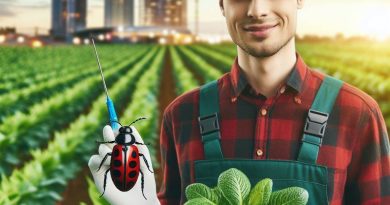Sustainable Farming Myths Debunked
Last Updated on March 2, 2024
Introduction
Concept of sustainable farming
Sustainable farming refers to the practice of producing food in an environmentally-friendly and resource-efficient manner.
Sustainable farming integrates practices that prioritize environmental stewardship, economic viability, and social equity. It aims to maintain soil health, conserve water resources, minimize chemical inputs, and support biodiversity.
By fostering resilient ecosystems and communities, sustainable farming ensures the long-term health and productivity of agricultural systems while meeting present needs.
Importance of debunking myths to promote accurate information
It is crucial to debunk myths surrounding sustainable farming to ensure accurate information is promoted.
Debunking farming myths is crucial to promote accurate information and informed decision-making in agriculture. It dispels misconceptions, fosters trust, and encourages sustainable practices.
Accurate information empowers farmers, policymakers, and consumers to make educated choices, ensuring the resilience and integrity of agricultural systems in an increasingly complex and interconnected world
The myths that will be debunked in the post
In this post, we will address and debunk common myths about sustainable farming.
Myth 1: Organic farming is always better for the environment
The belief that organic farming is more sustainable
Many people believe that organic farming is more sustainable because it does not use synthetic pesticides and fertilizers. They argue that this reduces soil contamination, protects biodiversity, and promotes healthier ecosystems.
Counterarguments and evidence against this myth
Potential drawbacks of organic farming practices
While organic farming avoids synthetic chemicals, it often relies on higher quantities of natural pesticides and fertilizers. These substances can still have negative effects on the environment if not used properly.
For instance, excessive use of organic fertilizers can lead to nutrient runoff, which can contribute to water pollution and harm aquatic life.
Negative environmental impacts associated with organic farming techniques
Organic farming requires more land to produce the same yield as conventional farming. This expansion contributes to deforestation and habitat loss, threatening wildlife populations.
Moreover, organic practices might result in lower crop yields, leading to the need for additional land conversion in order to meet food demand.
Evidence of greenhouse gas emissions related to organic farming
A study published in the journal Nature found that organic farming can result in higher greenhouse gas emissions per unit of food produced compared to conventional methods.
The study attributed this to the lower yields and larger land requirements of organic farming practices.
Limitations of organic farming in addressing global food security
With a growing global population, the challenge of feeding everyone while preserving the environment is crucial. Organic farming alone might not be sufficient to meet food demand due to its lower yields.
Therefore, a combination of sustainable conventional practices and innovative technologies might be necessary to achieve both food security and environmental protection.
Overall, while organic farming has its merits, the belief that it is always better for the environment does not hold up under scrutiny. It is essential to consider the potential drawbacks and environmental impacts associated with organic farming practices.
To achieve truly sustainable agriculture, a holistic approach that combines the best aspects of organic and conventional farming is needed.
By leveraging scientific advancements and incorporating responsible agricultural practices, we can strive for a future where agriculture is not only environmentally friendly but also capable of feeding the world’s growing population.
Read: Boost Yields with Crop Diversity
Myth 2: Large-scale farming is not sustainable
The belief that small-scale farming is more sustainable
Small-scale farming is often seen as more sustainable due to its lower environmental impact. It is believed that smaller farms can better manage resources and use eco-friendly farming practices.
Supporters argue that small-scale farms prioritize biodiversity, local food systems, and community engagement.
Disputing the myth by explaining the benefits and sustainability of large-scale farming
Efficiency, economies of scale, and advantages in resource management
Large-scale farming allows for efficient production and maximizes the use of available resources. Through economies of scale, larger farms can reduce cost per unit and increase productivity.
They can invest in advanced machinery and technology, enhancing resource management and reducing waste.
Technological innovations that improve large-scale farming sustainability
Large-scale farms often utilize precision agriculture techniques, such as GPS-enabled machines. These technologies enable precise planting, targeted use of fertilizers and pesticides, and optimal irrigation.
Automation and robotics improve efficiency, reduce labor, and minimize environmental impact. Additionally, large farms can invest in research and development for sustainable farming practices.
Additional points
Large-scale farming, when implemented responsibly, can have several advantages in terms of sustainability.
One of the main arguments against large-scale farming is the perception that it is environmentally damaging. However, there is evidence that challenges this notion and demonstrates the sustainability of large-scale farming practices.
Efficiency, economies of scale, and resource management are crucial factors supporting the sustainability of large-scale farming.
Unlike small-scale farms, large-scale operations can benefit from increased efficiency in various aspects of production. For instance, larger farms can use advanced machinery and technology to optimize resource use and minimize waste.
By mechanizing tasks, they can reduce the need for manual labor, resulting in reduced emissions and environmental impact.
Moreover, economies of scale enable large farms to reduce their cost per unit of production.
This cost advantage makes large-scale farming financially sustainable, allowing for reinvestment in research and sustainability efforts.
Larger operations can afford to implement innovative practices that enhance sustainability, such as soil conservation techniques and irrigation systems.
Additionally, they can invest in renewable energy sources like wind turbines and solar panels to reduce their carbon footprint.
Technological innovations are another reason why large-scale farming can be sustainable. Precision agriculture techniques utilize GPS and digital mapping to optimize field operations.
This allows for precise planting, targeted use of inputs like fertilizers and pesticides, and effective irrigation. By applying just the right amount of resources at the right time, large farms minimize waste and reduce environmental impact.
Advanced monitoring systems and automated machinery also contribute to sustainability by optimizing efficiency and ensuring accurate application.
Furthermore, large-scale farms often have the resources to invest in research and development. They can collaborate with scientists and experts to develop and adopt sustainable farming practices.
These collaborations enable the creation of innovative solutions for challenges such as water conservation and nutrient management.
By prioritizing research and development, large farms continually improve their sustainability performance.
In summary, the belief that small-scale farming is more sustainable than large-scale farming is a myth. While small-scale farming has its merits, large-scale farming can also be sustainable when implemented responsibly.
Efficiency, economies of scale, and technological innovations allow large farms to maximize resource utilization and minimize environmental impact.
By investing in sustainable practices and collaborating with experts, large-scale farming can contribute to a more sustainable agricultural future.
Read: Soil Health: Key to Good Crops

Myth 3: Genetically modified organisms (GMOs) are harmful to human health and the environment
Fear and misconceptions surrounding GMOs
Many people believe GMOs are unnatural and therefore pose a threat to human health and the environment.
There is a fear that consuming GMOs may result in negative health effects, such as allergies or antibiotic resistance.
Some individuals worry that GMOs can crossbreed with non-GMO plants, leading to uncontrollable consequences.
Debunking the myth by discussing scientific evidence supporting their safety and benefits
Studies and research supporting the safety of GMO consumption
Various scientific organizations, including the World Health Organization and the National Academy of Sciences, have stated that GMOs are safe for human consumption.
Extensive research has been conducted on GMOs, and no evidence of harm to human health has been found.
Potential environmental benefits of GMO crops, like pest resistance and reduced chemical use
GMO crops can be genetically engineered to resist pests, reducing the need for chemical pesticides.
This trait not only protects the plant but also reduces the environmental impact of pesticide use.
In short, the fear and misconceptions surrounding GMOs have been debunked by scientific evidence:
Extensive studies have proven the safety of GMO consumption, as recognized by reputable scientific organizations.
GMOs have the potential to benefit the environment by reducing chemical use and promoting pest resistance.
Regulatory processes ensure the safety and proper evaluation of GMOs before they are released to the market.
It is important to rely on scientific consensus to dispel myths and make informed decisions about GMOs.
Read: Pest Control in Sustainable Farming
Myth 4: Sustainable farming is not economically viable
The misconception that sustainable farming is not profitable
One common myth surrounding sustainable farming is the notion that it is not economically viable. Many believe that the costs associated with implementing sustainable practices outweigh the potential financial benefits.
However, this myth fails to consider the numerous ways in which sustainable farming can lead to cost savings and increased profitability for farmers.
Examples and success stories of economically viable sustainable farming practices
How sustainable practices can lead to cost savings and increased farm profitability
Sustainable farming practices, such as organic and regenerative agriculture, often require the use of fewer synthetic inputs like chemical fertilizers and pesticides.
While the initial investment in transitioning to sustainable methods may be higher, the long-term reduction in input costs can result in significant savings for farmers.
By relying on natural methods of pest control and nutrient management, farmers can reduce their dependence on expensive external inputs.
Furthermore, sustainable farming practices prioritize soil health and fertility. By implementing strategies like cover cropping, crop rotation, and composting, farmers can improve the quality and productivity of their soil.
This leads to higher crop yields and reduced reliance on expensive synthetic fertilizers. With healthier and more productive soil, farmers can achieve higher profits while minimizing their expenses.
Presenting case studies of successful sustainable farming businesses
Case studies of successful sustainable farming businesses provide concrete evidence of the economic viability of sustainable practices. For example, Polyface Farm, located in Virginia, has become a renowned example of a profitable and sustainable farm.
The farm utilizes rotational grazing systems, which not only improve soil health but also reduce the need for costly feed inputs. This has enabled the farm to achieve higher profits and maintain economic sustainability.
Another successful case study is Singing Frogs Farm, a California-based operation that specializes in no-till, intensive farming. By avoiding ploughing and tilling, the farm preserves soil structure and minimizes weed growth, reducing labor and herbicide expenses.
Singing Frogs Farm has been able to achieve high yields and generate impressive profits while minimizing their environmental impact.
In addition to these case studies, numerous studies and reports have highlighted the economic benefits of sustainable farming.
According to a report by the United Nations Food and Agriculture Organization, sustainable agriculture practices can increase farm incomes by up to 79% within ten years. This demonstrates the immense potential for profitability that sustainable farming holds.
In fact the myth that sustainable farming is not economically viable is unfounded. Sustainable practices can lead to cost savings through reduced input requirements and improved soil health.
Additionally, numerous successful sustainable farming businesses serve as real-world examples of the economic viability of sustainable farming.
By dispelling this myth and showcasing the potential for profitability, more farmers can be encouraged to adopt sustainable practices and contribute to a more sustainable agricultural system.
Read: Best Conservation Farming Tips
Delve into the Subject: Climate Change: Impact on Pest Management
Conclusion
Summarize the myths that have been debunked
In the end, several myths about sustainable farming have been debunked in this section.
Emphasis on the importance of understanding the truth about sustainable farming
It is crucial to understand the truth about sustainable farming in order to make informed decisions.
Understanding the truth about sustainable farming is paramount. It enables informed decision-making, dispels misconceptions, and fosters practices that benefit the environment, economy, and society.
Embracing the reality of sustainable farming ensures responsible stewardship of resources, resilient agricultural systems, and a more sustainable future for all.
Encourage readers to share the accurate information to foster a more sustainable agricultural industry
I encourage readers to share the accurate information discussed here to foster a more sustainable agricultural industry.
Let’s cultivate a sustainable agricultural industry by sharing accurate information. Educate others on best practices, debunk myths, and highlight success stories.
Through collective knowledge, we can empower farmers, policymakers, and consumers to make informed choices, driving positive change and fostering a more resilient and sustainable food system for future generations.


